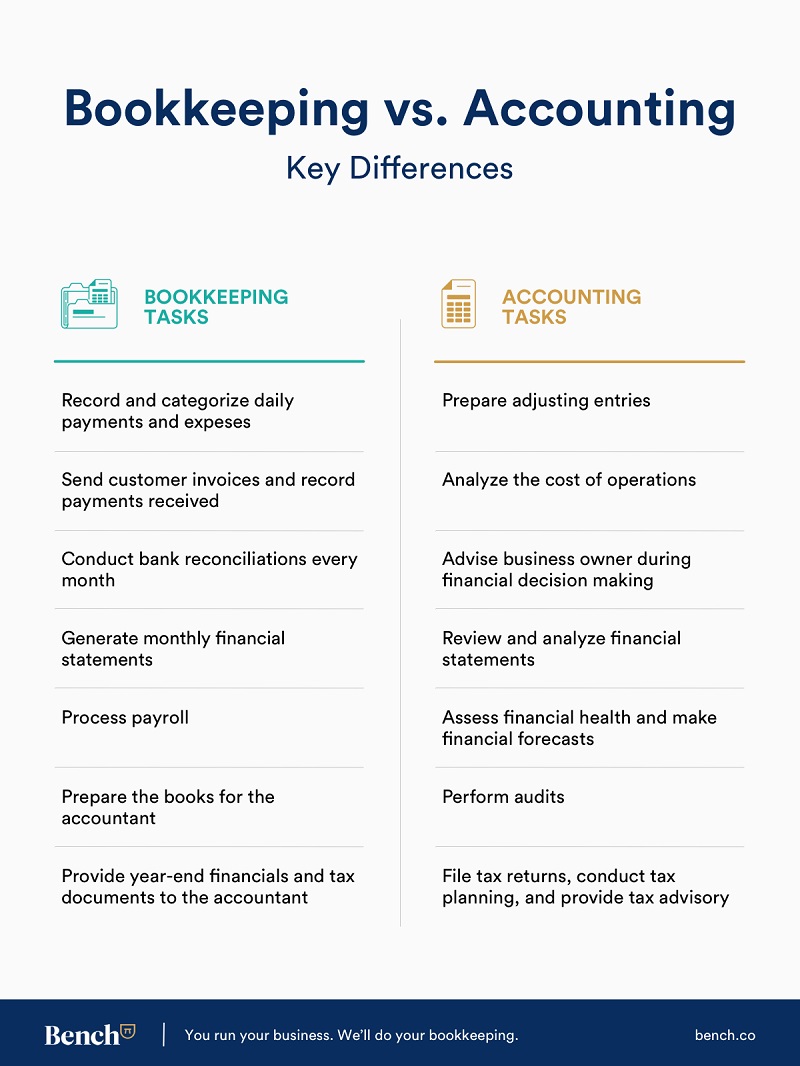From Stumble to Soar: How Consistent Tracking Turns Financial Plans into Profitable Realities
January 3, 2024
Stop Throwing Money Away! The Ultimate Guide to Reducing Your Small Business Tax Bill
January 25, 2024Part 1: Unveiling the Mystery: Bookkeepers vs. Accountants – Do You Need Both?
Demystifying the Confusion: Bookkeepers vs. Accountants
Navigating the financial world can feel like deciphering hieroglyphics. Numbers dance across spreadsheets, leaving many of us wondering: what exactly is the difference between a bookkeeper and an accountant?
Both bookkeepers and accountants play crucial roles in maintaining your financial health, but their expertise lies in distinct areas. Understanding these differences is key to determining if you need both professionals or if one can handle your needs.
Bookkeepers:
- The Hands-On Heroes: Think of bookkeepers as the data entry wizards and transaction trackers. They meticulously record every financial heartbeat of your business, from daily sales to bill payments.
- Ledgers & Lists: Their domain is maintaining ledgers, accounts payable and receivable, and ensuring all the numbers balance perfectly.
- Payroll Prodigies: Payroll processing and reconciliation fall under their purview, ensuring your team gets paid on time and accurately.
- Financial Reporting Champions: They generate financial reports like income statements and balance sheets, providing a snapshot of your financial standing.
Accountants:
- The Strategic Advisors: While bookkeepers focus on the daily grind, accountants zoom out to the bigger picture. They interpret the financial data, helping you understand what it means and plan for the future.
- Tax Titans: Dealing with taxes can be daunting, but accountants are here to conquer those forms. They handle tax planning and preparation, ensuring you comply with regulations and optimize your tax burden.
- Financial Architects: Budgeting and forecasting are their forte. They analyze your finances, project future performance, and help you make informed financial decisions.
- Internal Controls Guardians: Ensuring your financial systems are secure and compliant is their watchword. They implement internal controls to safeguard your assets and prevent fraud.
Do You Need Both? Exploring Synergies and Overlap
While their roles differ, bookkeepers and accountants form a powerful financial dream team. Their combined expertise offers numerous benefits:
- Efficiency and Accuracy: Bookkeepers maintain the data foundation, while accountants analyze it for insights, creating a smooth flow of information and minimizing errors.
- Cost-Effective Synergy: Hiring both professionals may seem expensive, but their collaborative approach can prevent costly mistakes and optimize your financial health, often saving you money in the long run.
- Strategic Clarity: With their combined expertise, you gain a clear view of your financial situation and direction, empowering you to make informed business decisions.
However, depending on your needs, one professional might suffice. In the next section, we’ll delve into factors to consider and help you assess whether you need the full financial dream team or if a solo act can handle your financial symphony.
Part 2: Assessing Your Needs: When to Hire an Accountant
Factors Dictating Your Decision: A Personalized Approach
Deciding whether to hire an accountant alongside your bookkeeper depends on several key factors:
- The Complexity of Your Financial Dealings: If your business involves numerous transactions, diverse income streams, or complex investments, an accountant’s expertise in interpretation and strategy becomes vital.
- Business Size and Stage of Growth: As your business grows, financial complexities multiply. For larger businesses experiencing rapid growth, an accountant’s guidance in scaling financial systems and navigating compliance complexities becomes invaluable.
- Tax Implications and Filing Requirements: Complex tax situations, like owning rental properties or multiple businesses, or facing audits, demand an accountant’s specialized knowledge and representation.
- Time Constraints and Personal Expertise: If managing your finances takes away from core business activities or exceeds your financial knowledge, an accountant can free up your time and provide expert guidance.
Red Flags that Scream for an Accountant
Sometimes, red flags within your existing bookkeeping system scream for an accountant’s intervention:
- Frequent Bookkeeping Errors or Inconsistencies: Unbalanced accounts, missing data, or recurring errors indicate potential underlying issues best addressed by an accountant’s diagnostic skills.
- Unclear Financial Picture or Lack of Financial Reports: If you lack a clear understanding of your financial health due to missing or inadequate reports, an accountant can interpret your data and present actionable insights.
- Upcoming Tax Audits or Complex Tax Situations: Facing an audit or dealing with intricate tax scenarios like cryptocurrency investments necessitates an accountant’s specialized knowledge and representation.
- Business Expansion or Legal Structure Changes: Expanding your business or altering its legal structure often involves complex financial and legal intricacies, requiring an accountant’s expertise in navigating these changes.
Scenarios When an Accountant is Essential
In certain situations, hiring an accountant is simply non-negotiable:
- Owning a Rental Property or Multiple Businesses: The diverse income streams and tax implications of these scenarios demand an accountant’s expertise in managing and optimizing returns.
- Investing in Stocks, Bonds, or Other Assets: Understanding investments involves intricate financial analysis and tax considerations, best handled by an accountant’s specialized knowledge.
- Receiving Government Grants or Contracts: Navigating the financial and compliance requirements of grants and contracts necessitates an accountant’s expertise in ensuring proper accounting and reporting.
- Facing Legal Disputes or Financial Restructuring: Dealing with legal battles or financial restructuring demands an accountant’s experience in complex financial analysis and potential litigation support.

Can’t Decide? Navigating the Grey Area
If you’re unsure about hiring an accountant, consider these intermediate solutions:
- Consulting with Both Professionals: Seeking joint advice from both a bookkeeper and an accountant can clarify your needs and provide valuable insights.
- Hiring a Bookkeeper with Advanced Accounting Skills: Some bookkeepers have advanced accounting qualifications, potentially fulfilling both roles initially.
- Utilizing Accounting Software for Increased Efficiency: Investing in robust accounting software can streamline bookkeeping tasks and provide basic financial analytics, potentially delaying the need for an accountant.
- Seeking Temporary Accounting Help for Specific Tasks: Hiring an accountant for specific projects, like tax preparation or year-end audits, can offer targeted expertise without full-time commitment.
Making the Choice: Finding the Right Accountant for You
Once you decide to hire an accountant, here’s how to find the perfect fit:
- Search for Qualified Professionals in Your Area: Look for Certified Public Accountants (CPAs) or other qualified accountants with experience relevant to your industry and needs.
- Consider Experience and Specialization: Choose an accountant with experience in your specific business sector or area of concern, like taxes or business growth.
- Checking Online Reviews and References: Research potential accountants online, read client reviews, and ask for references to gauge their reputation and client satisfaction.
- Conducting Interviews and Assessing Communication Styles: Meet with shortlisted accountants, discuss your needs and expectations, and ensure clear communication and a comfortable working relationship.
- Negotiating Fees and Setting Clear Expectations: Discuss fees, billing structures, and deliverables upfront to avoid misunderstandings and ensure your budget aligns with their services.

FAQs: Unraveling Common Doubts
Before concluding, let’s address some frequently asked questions to clear any lingering doubts:
Q: Can’t I just do my own bookkeeping and taxes?
- A: While doing your own bookkeeping and taxes may seem feasible for simple situations, complex finances benefit greatly from an accountant’s expertise. Managing taxes can be risky, and errors can lead to penalties and legal trouble. Consider engaging an accountant for complex tax scenarios for accurate filing and optimal results.
Q: How much does an accountant cost compared to a bookkeeper?
- A: Accountant fees vary based on experience, location, and services offered. Typically, they charge more than bookkeepers due to their advanced skills and specialized knowledge. However, consider their services as an investment in your financial health. The cost savings they can achieve through optimized taxes, improved efficiency, and avoided errors may often outweigh their fees.
Q: What level of access should I give my accountant?
- A: Transparency is key, but maintain reasonable boundaries. Grant access to necessary financial data and documents relevant to their tasks. Utilize secure online platforms for sharing information and consider two-factor authentication for enhanced security.
Q: Should I switch if my bookkeeping and accounting aren’t aligned?
- A: Open communication is crucial. Discuss discrepancies with your current professionals. If communication fails or trust is broken, consider seeking new professionals who can work collaboratively and ensure your financial data is accurate and aligned.
Remember: Building a strong financial team takes time and effort. By understanding the roles of bookkeepers and accountants, assessing your specific needs, and making informed choices, you can create a financial dream team that empowers your business growth and secures your financial future.
Beyond Your Decision:
This article has hopefully illuminated the differences between bookkeepers and accountants and empowered you to make the best decision for your financial needs. Remember, your financial journey is a continuous one. As your business and financial complexity evolve, revisit your needs and adapt your team accordingly.
Resources
- Provides research and analysis on tax policies and their impact on economies, offering insights and information on taxation-related issues.
- Offering resources, tools, and information to support and empower small businesses in the United States.
American Institute of Certified Public Accountants (AICPA)
- Providing resources, professional development opportunities, and information related to accounting and management accountancy.
With dedicated effort and the right financial team, you can navigate the financial world with confidence and achieve your business goals.




